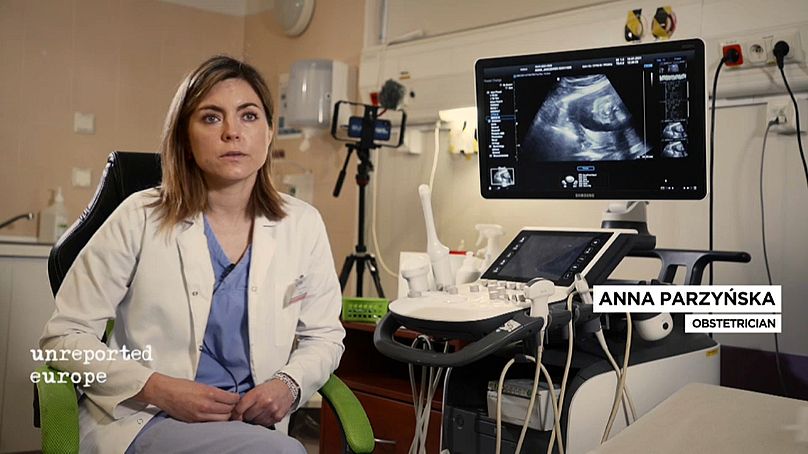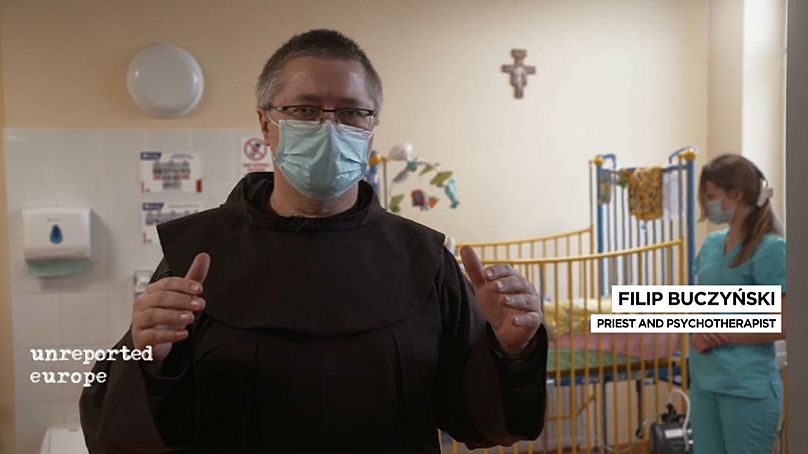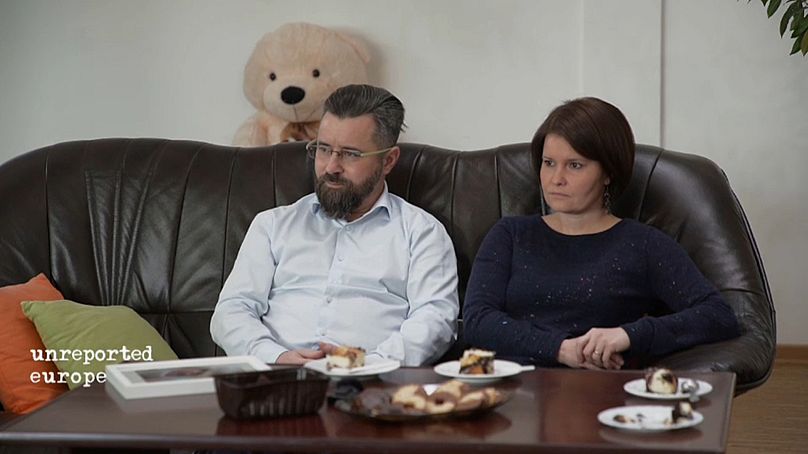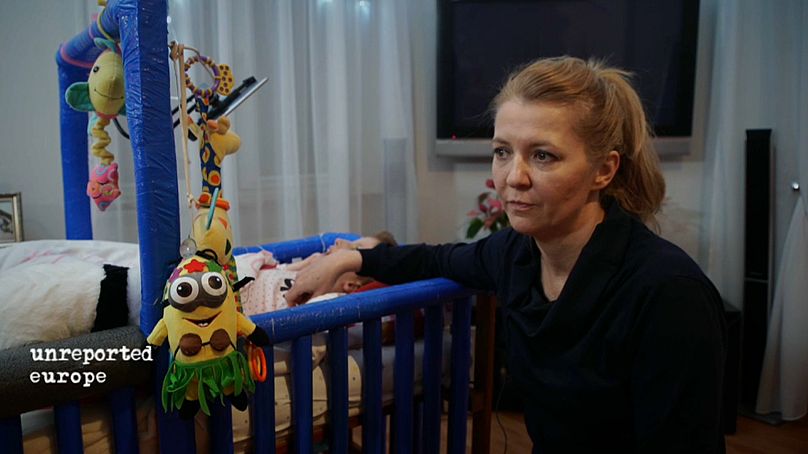A recent ruling by Poland's Constitutional Tribunal has made its already tough abortion law even stricter. On Unreported Europe we take a look at the implications of this law on those most affected by it.
In front of one of Warsaw's main hospitals, an ominous van is parked. Its sides are covered in an image of what is allegedly a dead fetus. It's a message from anti-abortion groups to one of the capital’s few facilities that still perform pregnancy terminations.
A recent ruling by the Constitutional Tribunal has just toughened one of the most restrictive abortion laws in Europe. Terminations in Poland were once only allowed in cases of rape, incest, danger to the mother's health or life, serious defects of the fetus or incurable disease. The new amendments mean that last option is now prohibited.
A few days before the decision became official, we met with one of the few doctors performing pregnancy terminations in the country.
Dr. Anna Parzynska tells us that the women she meets are women who want to be pregnant, for many they are even long-awaited pregnancies. But "some patients face abnormalities that will not allow the baby to live independently after childbirth". She gives us the example of a patient who was refused a termination by two Polish hospitals. The fetus suffered from kidney agenesis, meaning the kidneys were unable to develop during embryonic growth. It was impossible for the baby to survive. The doctor considers it "completely unethical" to force a woman to deliver "knowing that the day of birth will also be the day of the baby’s death".
Anna is determined to continue helping women who come to her for abortions, despite the ban. She tells us that women who learn that their child has an incurable disease or will die shortly after birth often present severe psychiatric disorders. This can lead to them having suicidal thoughts. She says that it's at this stage they can be qualified for an abortion due to the threat to their health and life.
Father Filip and his hospice
Lublin in the East of Poland is one of the most conservative parts of the country. Last year it recorded only three legal abortions. We headed there to visit a Franciscan priest who is trying to give women an alternative to abortion in the event of a fetal abnormality.
The perinatal hospice that Father Filip runs takes in children born with severe physical and neurological disabilities. Some are in contact with their families. Others were abandoned at birth. Life expectancy is often short. He tells us that sometimes housing conditions for the children are drastically bad and that they may require comfort that his premises can offer. His hospice is able to provide around the clock care if need be.
When asked, he says that he understands parents who decide to terminate pregnancies because they know they won't be able to cope with a disabled child. He tells us that parents in this situation must feel "a sense of immense helplessness, a lack of reference points and at the same time the inability to understand oneself". The goal of his hospice is to help parents "understand where they're at". According to the priest, helping the parents "gives them the impulse to think: we can manage, we can cope, as we have support. They can decide to take the risk to allow their child the right to live, rather than risk taking the child's life".
Father Filip is also a psychologist and psychotherapist. He leads support sessions for many couples in this situation. We spoke to some of them.
Kasya, Slavek and Samuel
Kasya and Slavek have two teenage children. For the last 5 years, they have celebrated the birth of their son, Samuel, who died 30 minutes after his birth. They found out he was likely to die this way several weeks before the end of the 24-week legal period for termination of pregnancy in the event of a fetal malformation. But to these devout Catholics, there was no question they would ever consider an abortion.
Kasya tells us that "it’s impossible in such situations, to avoid suffering, whether it’s suffering related to carrying, giving birth to, or bringing up a disabled child, or whether it’s suffering from guilt after having aborted a sick child". Her faith helped her get through the traumatic event of losing her son. But for her, the only option her conscience permitted was to give birth. She takes solace in her beliefs and trusts that her child "is not lying there in the ground, but that he is in heaven, in a better reality".
Her husband, Slavek, shares her sentiments and wants to help others in similar situations. He believes they can help parents to "make a decision that will not cost them so much pain afterwards". Slavek wants to help others, but he does not agree a law should impose restrictions. If anything he says the law should "give more opportunities, information to people about what support they can get in such situations". He wants the law to help people make a wise decision but not "condemn them to suffering when they are not ready for it".
Agata and Amelia
Agata has three children. Her youngest, Amelia, is 12 and suffers from Edwards Syndrome. She cannot walk, speak, eat or develop normally. Separated from her husband, Agata gave up everything to take care of her daughter. She gets help from her mother and she receives a state allowance of 450 euros a month. She is a staunch believer in banning abortions in all circumstances, but she wants more to be done than just forbidding it:
“The government's decision to ban abortion is one thing. But this decision must be followed by tremendous support for women who give birth to disabled children. These women are generally left alone (...) They have no money, they are on the verge of poverty. They have no outside support. Nothing is done for them. These women quickly fall into depression, so much so that they wither away with the baby, they are really deeply depressed and this sometimes leads to suicide."
A controversial ruling
It took three months for the constitutional court’s ruling to be officially published and thus enter into force. This delay is said to be down to the unprecedented wave of protests it unleashed on the country. For many Poles, the restrictions are not only a violation of women's rights, but they’re yet another attack on the fundamental rights of all citizens.
Last November, women staged several events to publicly declare they had undergone an abortion. It was a first for Poland.
Pro-Choice activists
Natalia teaches gender studies at university, but she is also an activist with the Abortion Dream Team, a group that helps women who want to terminate their pregnancies. We met her at her home a few weeks after she attended one of these events.
The association's hotline provides advice and support to women wishing to obtain abortion pills or to travel to a neighboring country where abortion is legal. Since the new restrictions were announced, her phone has not stopped ringing.
The estimated 1000 legal abortions recorded per year in the country concern only a small fraction of Polish women who wish to terminate their pregnancies. Natalia is campaigning for access to abortion for all those who are pushed underground by Polish law. Just like she was eight years ago when she took abortion pills. She tells us that the hardest thing for her when she took the pills "was the feeling of solitude". She felt too ashamed to ask for help and that nobody was there to support her.
To Natalia, the current law "creates an atmosphere of shame" and has divided social groups in the country further. She says that in Poland "more and more people live modestly, they can’t afford an abortion in Germany, the Netherlands or England, because it’s very expensive". The divide, she believes, has been exacerbated by the pandemic and many people who wanted to have a child can no longer afford one in the current economic climate.
A political perspective
Bartlomiej Wroblewski is a parliamentarian and member of the ruling Law and Justice party. He was one of many politicians to support the Constitutional Tribunal’s ruling. We met with him to get his take on the restrictions and the protests they have incurred. He says the ruling is all about prescribing the right to life in the Polish constitution, "it’s a universal right that protects all human beings, from the beginning to the end of life. People who are ill or disabled have the same right to live as healthy people like us do".
In regards to the protests, he says that the right to life is a human right that cannot depend on the mood of society. "It’s not the right of the majority, even if it is the majority of citizens, to decide who is a human being and who is not".
Just after we met Wroblewski, the country's leading feminist organisation, Women’s Strike, launched a new wave of protests. Despite police pressure and COVID-19 restrictions, human rights activists are determined to keep up the fight. The leaders of this movement insist that the mobilisation goes far beyond the abortion law.
Marta Lempart, the leader of All-Poland Women's Strike, describes the movement that started due to the new abortion restrictions as actually about freedom, "it goes for human rights, fundamental rights for judicial independence, for free media, for free elections, for everything. It's for freedom. It's really funny that the Catholic conservative country that Poland is, took abortion as the symbol of the freedom fight because that's what it is. We want the government to go".
Opponents of the government also accuse it of colluding with the country’s hardcore Catholic circles.
An ultra-conservative perspective
A few months ago a central Warsaw church was covered with tags by pro-choice activists. One of its leading priests is known for his ultra-conservative views. The new ban, he says, does not go far enough. In addition to cases of fetal malformation, he wants abortion to be forbidden in cases of rape, incest, and danger to the mother’s health or life.
Father Roman Trzcinski tells us that there is a clash or a fight between two realities: "there is a civilisation of death that is spreading throughout the world through atheistic movements. It is against life. It’s a civilization of death. The Gospel, on the other hand, is a civilisation of life and love". He believes that some people are being manipulated by the demonstrations, especially young girls and that they don't realise what they're doing. He says the fact that they're demonstrating will remain with them like a scar in their psyche, in their consciousness and in their soul.
These views are inadmissible for those who want full rights over their bodies.
Eva's story
We speak to a woman who we'll call Eva to protect her privacy. She had an abortion in Slovakia a few years ago. The stigma of abortion is so great that talking openly about it could cost her her job in the public sector. For her, the procedure was not the hardest part of the abortion process, it was everything else. She says she was "angry because everyone was hostile", no one wanted to help her get the paperwork she required to get the medication she needed. She describes to us the relief she felt after getting her abortion. She felt "no guilt, no remorse, no depression", just an "overwhelming feeling of rage".
Eva is a Roman Catholic, baptised and confirmed. She says she is proud that she fought for herself, for her life "as it was and as it is now". To her, the tragedy is giving birth to babies no one wants especially in the middle of Europe in the 21st century. She says people in Poland "cannot fully use our own human rights".
Legal action
On the night the new ban came into place pro-choice movements took to the streets again to challenge the legality of the Tribunal's ruling. The EU Commissioner for Human Rights and the Council of Europe have slammed it as a violation of human rights.
Polish Human rights activists promise to prosecute those responsible for the ban in Polish courts and they say they will take those who will enforce it to the European Court of Human Rights.














